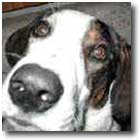|
Britain's National Health Service recently approved
a trial for dogs capable of sniffing out prostate
cancer in the hope that it could show up
inaccuracies in the current PSA (prostate specific
antigen) test.
The scientific basis of the ability of dogs to
detect the odour of cancer is believed to be linked
to volatile organic compounds produced by malignant
cells. It has been established that during tumour
growth changes occur in some of the cellular
proteins, leading to peroxidation of the cell
membrane components, which then produces volatile
organic compounds that can be detected in the
headspace of the cells.
There is strong indication from a number of studies
that these cancer volatiles are excreted in urine or
exhaled on the breath at an early stage in the
disease process..

Supporting evidence has been published around the
world including a study by Cornu and colleagues
(European Urology 2011), ‘Olfactory Detection of
Prostate Cancer by Dogs Sniffing Urine: A Step
Forward in Early Diagnosis’, indicated the
possibilities of canine cancer detection
(sensitivity 91%, specificity 91%).
A second study published online in 2011 by Sonoda
and colleagues investigated colorectal cancer
screening using faecal samples, and demonstrated
equally promising results (sensitivity 97%,
specificity 99%).
A recent study from Italy (Taverna et al, Journal of
Urology 2014), reported the diagnostic accuracy of
dogs trained to recognize specific volatile organic
compounds of prostate cancer in urine samples
(sensitivity 98–100%; specificity 98–99%).
Ehmann et al (European Respiratory Journal, 2012)
carried out the first published study showing that
sniffer dogs can reliably detect lung cancer from a
breath sample (sensitivity 71% specificity 93%).
The scientists hope that dogs could provide a second
line cancer screening service that demonstrated a
low false positive rate and higher accuracy. And if
dogs can be proved to be a reliable screening tool,
a test could eventually be developed that is far
superior to the PSA test.
Dogs undergo training for a period of about six
months, after which they can reliably identify urine
with traces of cancer cells in it.
In the future you could have a machine that sits on
your consultant's desk, you'd put the urine sample
in it and it would tell you if it was positive or
negative but a viable electronic nose is still many
years away. The problem the electronic nose
scientist has is that currently their sensitivity is
well below the dog: a dog can find parts per
trillion while an electronic nose cannot.
For more information
Medical Detection Dogs
Olfactory System of Highly Trained Dogs Detects
Prostate Cancer in Urine Samples
Gianluigi Taverna, Lorenzo Tidu, Fabio Grizzi,
Valter Torri, Alberto Mandressi, Paolo Sardella,
Giuseppe La Torre, Giampiero Cocciolone, Mauro
Seveso, Guido Giusti, Rodolfo Hurle, Armando
Santoro, Pierpaolo Graziotti
http://dx.doi.org/10.1016/j.juro.2014.09.099
MDN |